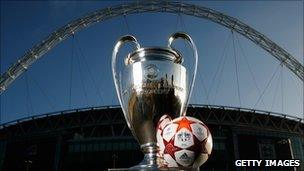Who, What, Why: How can a booking fee be 拢26?
- Published

Many fans are unhappy about the Champions League final booking fees
Football authorities Uefa are under fire over the high cost of Champions League final tickets, which include a 拢26 booking fee. How can processing a reservation cost so much?
That watching modern football is an expensive business may be a familiar observation to fans - and now paying a fee just so you can pay to see a game is the latest target of fans' ire.
The forthcoming Champions League final at London's Wembley stadium has generated criticism over the fact that its cheapest tickets will cost 拢150 plus a booking fee of 拢26.
Michael Brunskill, spokesman for the Football Supporters Federation (FSF), says that being charged "拢26 for the privilege of buying a ticket for anything is outrageous".
But Uefa, who are responsible for the event, say that the booking fee reflects the fact that the reservation is made through agents Ticketmaster while the tickets are sent by despatch firms UPS or Fedex.
The cost of sending tickets this way is 拢13.50 each, Uefa says, while the fee also covers credit card charges and "administration of a full customer service operation".
But critics of the high cost of tickets include Michel Platini, Uefa's president, who admitted that the pricing structure "isn't brilliant" and promised to look at it again in future years.
However, Uefa's general secretary, Gianni Infantino, has insisted that prices for the 2011 final will not change as tickets have already gone on sale.
A spokesman for the organisation defended the booking fee, insisting that the fee reflected the price charged by the agency who sell the tickets and the dispatch firm who deliver them.
However, with three English teams still in contention for a place in the Wembley final, UK fans' groups have attacked the 拢26 booking charge.
Mr Brunskill says charging simply for making a reservation is always guaranteed to get up the noses of supporters, but the high cost of processing a Wembley seat sale is especially egregious.
"For a 拢26 admin fee many fans would want a gold-plated envelope hand-delivered by Michel Platini himself," he says.
"Tickets for the Champions League final are already expensive enough without UEFA trying to squeeze every last penny out of football fans."
The Society of Ticket Agents and Retailers, the self-regulatory body of UK ticketing industry, insists in its code of practice that members identify booking fees separately from the face value of the ticket so consumers are aware of how they are being charged.
Official ticket agencies, such as Ticketmaster, Seetickets.com, and Ticketline.co.uk, are outlets authorised to sell concert tickets on behalf of organisers.
Ticket agencies charge additional fees in the shape of booking fees and postage costs on top of the face value of the ticket.
While the agency does not set the price of the ticket, it does decide the additional costs.
Ticketmaster declined to comment. It has explained in the past that its booking fee pays for, among other things, its distribution network, the installation and maintenance of computer hardware and software, telephone lines, labour and other all costs associated with the ticket transaction, including implementing anti-fraud procedures.
The additional handling fee pays for costs associated with the staffing, installation and maintenance of printing equipment, stationery and the cost of postage or, where necessary, delivery to the venue for collection.
But charges can vary widely between concerts and agents.
Nonetheless, the charges have often proved unpopular with spectators. A 2004 survey of the ticketing market by the Office of Fair Trading reported a widespread "dislike of additional fees".
In response to such sentiments, pop singer Kylie Minogue pledged to drop booking fees from her 2011 arena tour as a "thank you" gesture to fans.